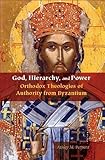God, Hierarchy, and Power : Orthodox Theologies of Authority from Byzantium / Ashley M. Purpura.
Material type: TextSeries: Orthodox Christianity and Contemporary ThoughtPublisher: New York, NY : Fordham University Press, [2017]Copyright date: ©2018Description: 1 online resource (240 p.)Content type:
TextSeries: Orthodox Christianity and Contemporary ThoughtPublisher: New York, NY : Fordham University Press, [2017]Copyright date: ©2018Description: 1 online resource (240 p.)Content type: - 9780823278374
- 9780823278398
- 262/.8 23
- BX340
- online - DeGruyter
- Issued also in print.
| Item type | Current library | Call number | URL | Status | Notes | Barcode | |
|---|---|---|---|---|---|---|---|
 eBook
eBook
|
Biblioteca "Angelicum" Pont. Univ. S.Tommaso d'Aquino Nuvola online | online - DeGruyter (Browse shelf(Opens below)) | Online access | Not for loan (Accesso limitato) | Accesso per gli utenti autorizzati / Access for authorized users | (dgr)9780823278398 |
Browsing Biblioteca "Angelicum" Pont. Univ. S.Tommaso d'Aquino shelves, Shelving location: Nuvola online Close shelf browser (Hides shelf browser)

|

|

|

|

|

|

|
||
| online - DeGruyter Disappointment : Toward a Critical Hermeneutics of Worldbuilding / | online - DeGruyter Liturgical Theology after Schmemann : An Orthodox Reading of Paul Ricoeur / | online - DeGruyter Reconstruction in a Globalizing World / | online - DeGruyter God, Hierarchy, and Power : Orthodox Theologies of Authority from Byzantium / | online - DeGruyter How to Do Comparative Theology / | online - DeGruyter Mocking Bird Technologies : The Poetics of Parroting, Mimicry, and Other Starling Tropes / | online - DeGruyter Flashpoints for Asian American Studies / |
Frontmatter -- Contents -- Introduction: Challenge of Hierarchy for Orthodoxy -- CHAPTER 1. Dionysius the Areopagite's Divinizing Hierarchy -- CHAPTER 2. Maximus the Confessor and Christological Realization -- CHAPTER 3. Niketas Stethatos's Hierarchic Re- Imaging -- CHAPTER 4. Nicholas Cabasilas and Embodied Authority -- CHAPTER 5. Thearchical Power in Theory and Practice -- Conclusion -- Notes -- Index
restricted access online access with authorization star
http://purl.org/coar/access_right/c_16ec
In the current age where democratic and egalitarian ideals have preeminence, Eastern Orthodox Christianity, among other hierarchically organized religious traditions, faces the challenging questions: "Why is hierarchy maintained as the model of organizing the church, and what are the theological justifications for its persistence?" These questions are especially significant for historically and contemporarily understanding how Orthodox Christians negotiate their spiritual ideals with the challenges of their social and ecclesiastical realities.To critically address these questions, this book offers four case studies of historically disparate Byzantine theologians from the sixth to the fourteenth-centuries-Dionysius the Areopagite, Maximus the Confessor, Niketas Stethatos, and Nicholas Cabasilas-who significantly reflect on the relationship between spiritual authority, power, and hierarchy in theoretical, liturgical, and practical contexts. Although Dionysius the Areopagite has been the subject of much scholarly interest in recent years, the applied theological legacy of his development of "hierarchy" in the Christian East has not before been explored.Relying on a common Dionysian heritage, these Byzantine authors are brought into a common dialogue to reveal a tradition of constructing authentic ecclesiastical hierarchy as foremost that which communicates divinity.
Issued also in print.
Mode of access: Internet via World Wide Web.
In English.
Description based on online resource; title from PDF title page (publisher's Web site, viewed 02. Mrz 2022)


